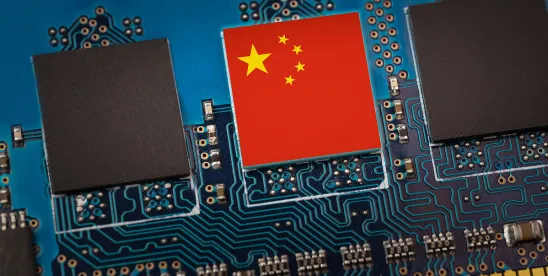What Happened Last Week: Commerce Secretary Raimondo’s Remarks on U.S.-China Competition
Secretary of Commerce Gina Raimondo said export controls will be “strategically and continuously” updated in remarks at MIT on November 30.
-
Raimondo said the U.S. is working with allies on semiconductor tooling restrictions and hopes they “will take steps similar to ours” and emphasized that “semiconductors are ground-zero in this technological competition” and “central to the U.S.’s new investment strategy.”
-
Three technology areas were identified to be of “particular importance over the coming decade:” computing-related technologies (microelectronics, quantum information systems, and artificial intelligence), biotechnologies, and clean energy technologies.
ICYMI
-
NDAA SEMICONDUCTOR PROVISION. A provision proposed by Senate Majority Leader Chuck Schumer (D-NY) and Sen. John Cornyn (R-TX) will reportedly be included in a compromise version of the National Defense Authorization Act (NDAA) expected this week. This provision is expected to block certain federal contractors from providing semiconductor products and services made by Chinese firms and would enter into force in five years.
Opposition: A coalition of defense, tech and business trade groups has pushed back on the proposal, arguing the prohibition would impose “tremendous compliance burdens” on government contractors and grant or loan recipients.
-
U.S.-CHINA CHIP COOPERATION. China’s Ministry of Commerce has begun to help its domestic companies through end-use checks by the U.S., which are required by the U.S. Department of Commerce prior to removing firms from its Unverified List. Chinese firms on the Unverified List have 60 days from October 7 to show their products will not go to a military end-use or risk being pushed onto the U.S. Entity List.
-
LAWMAKERS PUSH TO EXPAND DEFENSE PRODUCTION ACT (DPA). Lawmakers led by Sen. Catherine Cortez Masto (D-NV) sent a letter to President Biden urging the Department of Defense and Department of Commerce to consider exercising expanded DPA authorities to ensure sustained access to microelectronic supplies needed by the U.S. computer numerically controlled (CNC) manufacturing base.
-
CALL FOR MORE CHIP SUBSIDIES. At a think tank event, Rep. Jim Himes (D-CT), Chair of the New Democrat Coalition, called for more action to aid the semiconductor industry, beyond the July CHIPS Act. Influential advocacy groups, such as the Semiconductor Industry Association (SIA), are beginning to do the same.
-
EU TO BUILD SEMICONDUCTOR HUB. Last week, European Union nations agreed to pursue a €43 billion ($44.4 billion) plan to jump-start the bloc’s semiconductor production, clearing a key hurdle in its plan to bolster high-tech industry. The deal was backed Wednesday by EU ambassadors, according to people familiar with the matter.
-
NEW REPORT ON EXPORT CONTROLS. The Center for Strategic and International Studies (CSIS) released a new report on Monday urging for stronger limits on the export of U.S.-made technology to contain threats from China and calling for an additional budget appropriation of $44.6 million annually to the Bureau of Industry and Security (BIS).
What To Watch This Week
-
On December 6, President Biden travelled to Phoenix, Arizona to visit a Taiwan Semiconductor Manufacturing Co. (TSMC) facility and discuss his economic plan.
-
The Industrial Advisory Committee will hold a meeting on December 8 to update the committee on the progress of the CHIPS for America initiative’s research and development programs, receive updates from the committee working groups, and allow the committee to deliberate and discuss the progress that has been made.
Rong Qin also contributed to this article.






 />i
/>i
